Multimodal LLMs
Q4'25: Technology Update – Low Precision and Inference Optimizations
Authors
Nikolay Lyalyushkin, Liubov Talamanova.
About
A quarterly digest on quantization, pruning, sparse attention, KV cache optimization, and related techniques for efficient AI inference.
Contributions welcome! We can't cover everything—if you spot something notable, open a PR in github.com/openvinotoolkit/technology_updates or let us know.
Summary
This quarter's research reveals several converging trends in efficient AI:
- Hadamard and learned rotations are now standard in quantization pipelines. The focus has shifted from whether to use rotations to how to compute them efficiently—via QR decomposition or per-block optimal transforms. New evidence shows integer formats (MXINT8, NVINT4) can outperform floating-point alternatives when combined with rotation-based outlier suppression.
- Diffusion-based video generation benefits from intelligent caching strategies with global outcome-aware metrics and principled optimization, replacing prior greedy approaches.
- LLM-based agents now achieve 100% correctness on KernelBench - GPU kernel benchmark.
Highlights
Quantization
- Gated Attention for Large Language Models: Non-linearity, Sparsity, and Attention-Sink-Free (https://arxiv.org/pdf/2505.06708). The authors introduce Gated Attention, a simple architectural refinement that inserts a learnable, input-dependent sigmoid gate directly after the output of Scaled Dot-Product Attention, introducing query-dependent sparsity and crucial non-linearity between the value and final output projections. This minimal change suppresses redundant attention contributions, eliminates training instabilities like loss spikes, and consistently improves perplexity and downstream performance across both 15B MoE and 1.7B dense models trained on massive datasets. Notably, it directly addresses the root causes of the attention sink and massive activations through learned, input-sensitive sparsity—eliminating the need for manual workarounds like special sink tokens or ad hoc normalization tricks. As a result, the model exhibits far better long-context extrapolation, maintaining performance even when context lengths are extended beyond the training range. The reduction in extreme activation values and the elimination of disproportionate attention to early tokens suggest that this approach will make models more amenable to compression techniques such as quantization and token pruning, by creating a more uniform, sparse, and predictable activation profile. The code: https://github.com/qiuzh20/gated_attention
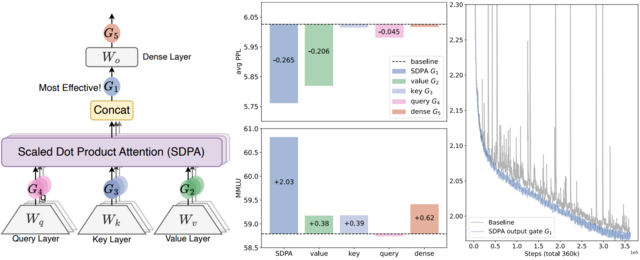
- INT v.s. FP: A Comprehensive Study of Fine-Grained Low-bit Quantization Formats (https://arxiv.org/abs/2510.25602). A comprehensive study on fine-grained, low-bit quantization formats challenges the current industry shift toward floating-point (FP) formats. The authors provide an in-depth analysis of quantization error using both theoretical Gaussian data and experimental training tensors, revealing a critical crossover point: floating-point formats are preferable for handling the high crest factors typical of coarse-grained quantization, whereas integer formats excel when crest factors are low, a condition common in fine-grained, block-wise quantization. Validating this insight across 12 diverse LLMs for direct-cast inference, the experiments consistently conclude that MXINT8 is superior to MXFP8 in accuracy and that NVINT4 can surpass NVFP4 when paired with outlier suppression techniques like Hadamard rotation. Furthermore, training experiments conducted with 1B and 3B Llama-3-style models demonstrate the superiority of MXINT8 over MXFP8, achieving nearly the same average accuracy across six common-sense reasoning tasks as standard BF16 training. The code: https://github.com/ChenMnZ/INT_vs_FP
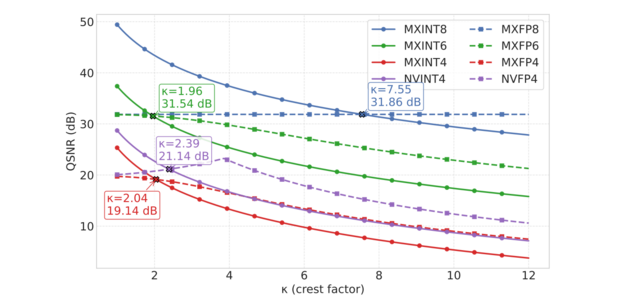
Pruning / Sparsity
- Sparse VideoGen2: Accelerate Video Generation with Sparse Attention via Semantic-Aware Permutation (https://arxiv.org/pdf/2505.18875). SVG2 is a training-free sparse attention method designed to accelerate video generation in DiT-based models. Its core idea is to use semantic-aware permutation to better identify critical tokens and reduce unnecessary sparse-attention overhead. The method introduces three key techniques:
- Semantic-aware permutation: k-means clustering is applied to the Q/K/V vectors of each head and layer, and tokens are permuted by cluster to form semantically coherent blocks, improving the accuracy of critical-token detection.
- Dynamic top-p critical-token selection: Cluster centroids approximate attention scores, and clusters (and their tokens) are selected until the cumulative probability reaches p, enabling dynamic compute budgeting.
- Customized sparse-attention kernels: Since semantic-aware clusters vary naturally in size, custom kernels are used to support dynamic block sizes, which fixed-size sparse kernels cannot handle efficiently.

Notable results
Quantization
- WUSH: Near-Optimal Adaptive Transforms for LLM Quantization (https://arxiv.org/pdf/2512.00956). This work introduces WUSH, a method that derives optimal blockwise transforms for joint weight-activation quantization in large language models. WUSH consistently reduces quantization loss and improves LLM accuracy across MXFP4 and NVFP4 formats compared to the Hadamard transform across various LLM architectures (e.g., Llama-3.2-3B, Qwen3-14B). This comes at the cost of increased inference overhead, since WUSH computes a unique, data-dependent transform for each block, rather than reusing a single fixed Hadamard transform across all blocks.

- STaMP: Sequence Transformation and Mixed Precision for Low-Precision Activation Quantization (https://arxiv.org/abs/2510.26771). STaMP is a post-training quantization technique designed to enhance the accuracy of low-bit activation quantization in large generative models by exploiting correlations along the sequence dimension rather than just the feature dimension. It combines invertible linear transformations—such as the Discrete Wavelet Transform (DWT) or Discrete Cosine Transform (DCT)—with mixed-precision quantization to concentrate the majority of activation energy into a small subset of tokens. These high-energy tokens are preserved at higher bit depths (e.g., 8-bit), while the remaining tokens are quantized to lower precision (e.g., 4-bit). The approach reduces quantization error more effectively than uniform bit allocation, especially under aggressive 4-bit constraints, and works synergistically with existing methods like SmoothQuant or QuaRot that operate on feature axes. Crucially, because the sequence transformation is orthogonal and linear, its inverse can often be merged with downstream operations such as bias addition or matrix multiplication, resulting in negligible additional computational cost during inference. The method requires no retraining and has been shown to improve both language and vision models consistently across benchmarks.
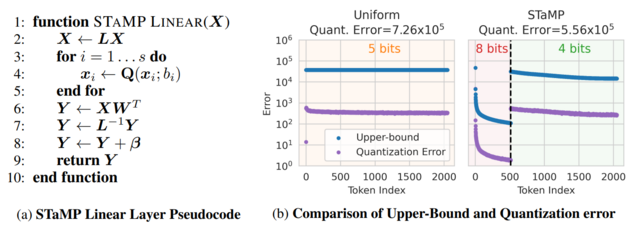
- KVLinC: KV CACHE QUANTIZATION WITH HADAMARD ROTATION AND LINEAR CORRECTION (https://arxiv.org/pdf/2510.05373v1). KVLinC is a framework designed to mitigate attention errors arising from KV cache quantization. The authors integrate two complementary techniques to enable robust low-precision caching. First, through a detailed analysis of Hadamard rotation-based quantization strategies, they show that applying channel-wise quantization to raw keys and token-wise quantization to Hadamard-transformed values minimizes quantization error. Second, to address residual errors from quantized keys, they propose lightweight linear correction adapters that explicitly learn to compensate for distortions in attention. Extensive evaluation across the Llama, Qwen2.5, and Qwen3 model families demonstrates that KVLinC consistently matches or surpasses strong baselines under aggressive KV-cache compression. Finally, the authors develop a custom attention kernel that delivers up to 2.55× speedup over FlashAttention, enabling scalable, efficient, and long-context LLM inference.
- DartQuant: Efficient Rotational Distribution Calibration for LLM Quantization(https://arxiv.org/pdf/2511.04063). DartQuant introduces an efficient method for quantizing large language models (LLMs). Instead of relying on computationally expensive end-to-end fine-tuning of rotation matrices—as done in methods like SpinQuant and OSTQuant—DartQuant eliminates the need for task-specific losses and instead optimizes activation distributions to be more uniform, using a novel loss function called Whip loss. This approach reduces the impact of extreme outliers in activations, which are a major source of quantization error, by reshaping the distribution from a Laplacian-like form toward a uniform one within a bounded range. To further reduce overhead, DartQuant proposes QR-Orth, an optimization scheme that leverages QR decomposition to enforce orthogonality on rotation matrices without requiring complex manifold optimizers like Cayley SGD. This cuts the computational cost of rotation calibration by 47× and memory usage by 10× on a 70B model, enabling full rotational calibration on a single consumer-grade RTX 3090 GPU in under 3 hours. The method maintains or slightly improves upon state-of-the-art quantization accuracy across multiple LLMs (Llama-2, Llama-3, Mixtral, DeepSeek-MoE) and evaluation benchmarks, including zero-shot reasoning tasks and perplexity metrics, while being robust to different calibration datasets and sample sizes. The code: https://github.com/CAS-CLab/DartQuant

Pruning / Sparsity
- SparseVILA: Decoupling Visual Sparsity for Efficient VLM Inference (https://arxiv.org/pdf/2510.17777). SparseVILA addresses the scalability limitations of Vision Language Models (VLMs) caused by the high computational cost of processing extensive visual tokens in long-context tasks. The framework introduces a decoupled sparsity paradigm that applies distinct optimization strategies to the prefill and decoding stages of inference. During the prefill phase, the model employs query-agnostic pruning to remove redundant visual data based on salience, efficiently creating a compact shared context. In contrast, the decoding phase utilizes query-aware retrieval to dynamically select only the specific visual tokens relevant to the current text query from the cache. This design preserves the integrity of multi-turn conversations by retaining a comprehensive visual cache, allowing different tokens to be retrieved for subsequent questions without permanent information loss. Experimental results demonstrate that SparseVILA achieves up to 2.6x end-to-end speedups on long-context video tasks while maintaining or improving accuracy across various image and reasoning benchmarks.
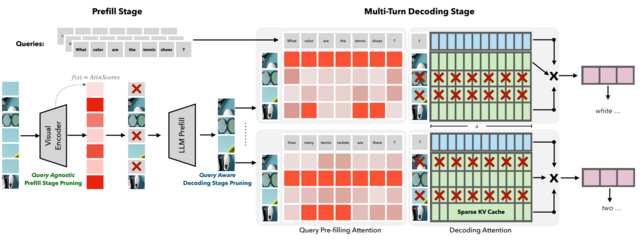
- THINKV: THOUGHT-ADAPTIVE KV CACHE COMPRESSION FOR EFFICIENT REASONING MODELS (https://arxiv.org/pdf/2510.01290v1). ThinKV is a KV cache compression framework for Large Reasoning Models (LRMs) on tasks like coding and mathematics. It classifies CoT tokens into Reasoning (R), Execution (E), and Transition (T) based on attention sparsity (T > R > E) using an offline calibration phase with Kernel Density Estimation to determine sparsity thresholds. The framework employs two main strategies:
- Think Before You Quantize: assigns token precision by importance. R/E tokens use 4-bit NVFP4, T tokens use 2-bit ternary, with group quantization (g=16) and shared FP8 (E4M3) scales; keys are quantized per-channel, values per-token. Outlier Transition thoughts are recognized as vital for backtracking and preventing model loops. Token importance is measured via KL divergence of the final answer distribution when a thought segment is removed.
- Think Before You Evict: a thought-adaptive eviction scheme aligned with PagedAttention. K-means clustering on post-RoPE key embeddings retains cluster centroids and corresponding values for evicted segments.

Caching
- LeMiCa: Lexicographic Minimax Path Caching for Efficient Diffusion-Based Video Generation (https://arxiv.org/pdf/2511.00090). LeMiCa is a novel, training-free, and efficient acceleration framework for diffusion-based video generation. The key idea is to take a global view of caching error using a Global Outcome-Aware error metric, which measures the impact of each cache segment on the final output. This approach removes temporal heterogeneity and mitigates error propagation. Using this metric, LeMiCa builds a Directed Acyclic Graph (DAG) in which each edge represents a potential cache segment, weighted by its global impact on output quality. The DAG is generated offline using multiple prompts and full sampling trajectories. LeMiCa then applies lexicographic minimax optimization to choose the path that minimizes worst-case degradation. Among all feasible paths under a fixed computational budget, it selects the one with the smallest maximum error. LeMiCa-slow achieves the highest reconstruction quality, reducing LPIPS from 0.134 → 0.05 on Open-Sora and 0.195 → 0.091 on Latte—over 2× improvement compared to TeaCache-slow. LeMiCa-fast improves inference speed from 2.60× → 2.93× on Latte relative to TeaCache-fast, while preserving visual quality. Unlike prior work that relies on online greedy strategies, LeMiCa precomputes its caching policy, eliminating runtime overhead. Code: https://unicomai.github.io/LeMiCa.

- CacheDiT: A PyTorch-native and Flexible Inference Engine with Hybrid Cache Acceleration and Parallelism for 🤗 DiTs (https://github.com/vipshop/cache-dit). It provides a unified cache API that supports features like automatic block adapters, DBCache, and more, covering almost all Diffusers' DiT-based pipelines. DBCache is a training-free Dual Block Caching mechanism inspired by the U-Net architecture. It splits the DiT Transformer block stack into three functional segments:
- Probe (front): performs full computation to capture residual signals and compare them with the previous step.
- Cache (middle): skips computation and reuses cached outputs when residual changes stay below a configurable threshold.
- Corrector (rear): always recomputes to refine outputs and correct any accumulated deviations. This probe → decision → correction loop enables structured, reliable caching that can be applied across DiT models without any retraining.

Inference
- vLLM-Gaudi - First Production-Ready vLLM Plugin for Intel® Gaudi® (https://docs.vllm.ai/projects/gaudi/en/v0.11.2/). Fully aligned with upstream vLLM, it enables efficient, high-performance large language model (LLM) inference on Intel® Gaudi®.
Compilation
- KernelFalcon: Autonomous GPU Kernel Generation via Deep Agents (https://pytorch.org/blog/kernelfalcon-autonomous-gpu-kernel-generation-via-deep-agents/). A deep agent architecture for generating GPU kernels that combines hierarchical task decomposition and delegation, a deterministic control plane with early-win parallel search, grounded tool use, and persistent memory/observability. KernelFalcon is the first known open agentic system to achieve 100% correctness across all 250 L1/L2/L3 KernelBench tasks.
Q3'25: Technology Update – Low Precision and Model Optimization
Authors
Nikolay Lyalyushkin, Liubov Talamanova, Alexander Suslov, Souvikk Kundu, Andrey Anufriev.
Summary
During Q3 2025, substantial progress was made across several fronts in efficient LLM inference — particularly in low-precision weight quantization, KV-cache eviction and compression, attention reduction through sparse and hybrid architectures, and architecture-aware optimization for State Space Models and Mixture-of-Experts. Notably, compression methods began to see adoption for FP4 formats, extending beyond traditional integer quantization, and numerous studies show that advanced KV-cache optimizations push the state of the art, achieving order-of-magnitude memory savings and notable speedups.
Highlights
- Bridging the Gap Between Promise and Performance for Microscaling FP4 Quantization (https://arxiv.org/pdf/2509.23202). The authors provide a rigorous analysis of FP4 microscaling formats (MXFP4 and NVFP4) for LLM quantization, introduce Micro-Rotated-GPTQ (MR-GPTQ) and the QuTLASS GPU kernels to bridge the performance gap for such formats. The method uses MSE-optimized grids, static activation reordering, and fused online Hadamard rotations to recover 98-99% of FP16 accuracy while achieving up to 4x inference speedups on modern GPUs. Key insights from the analysis include:
- The effectiveness of Hadamard transforms depends on the quantization group size; while they are beneficial for MXFP4 and INT4, they can actually degrade NVFP4 accuracy.
- MR-GPTQ consistently improves the accuracy of the lower-performing MXFP4 format, bringing it within 1-2% of NVFP4's performance.
- On average, NVFP4 and INT4 (with group size 32) offer similar quality.
- MXFP4 kernels may achieve ~15% higher throughput than NVFP4 on B200 GPUs, likely due to simpler hardware implementation.
The code available at: https://github.com/IST-DASLab/FP-Quant.

- Radial Attention: O(n log n) Sparse Attention with Energy Decay for Long Video Generation (https://arxiv.org/pdf/2506.19852). The paper "Radial Attention" introduces a sparse attention mechanism to optimize long video generation. Its core method reduces computational complexity from O(n2) to O(nlogn) using a static mask inspired by "Spatiotemporal Energy Decay," where attention focuses on spatially and temporally closer tokens. This architecture is highly optimized for inference. It delivers up to a 3.7x speedup on extended-length videos compared to standard dense attention, without any discernible loss in visual quality. For a concrete 500-frame, 720p video, the mechanism slashes the raw attention computation by a factor of 9x. The industrial impact is significant. Designed as a "plug-and-play" module, Radial Attention can be integrated into powerful pre-trained models like Wan2.1-14B and HunyuanVideo through efficient LoRA-based fine-tuning.

- Expected Attention: KV Cache Compression by Estimating Attention from Future Queries Distribution (https://arxiv.org/pdf/2510.00636). Expected Attention is a training-free KV cache compression method for LLMs that does not rely on observed attention scores, making it compatible with FlashAttention, where attention matrices are never materialized. It estimates the importance of cached key–value pairs by predicting how future queries will attend to them. Since hidden states before attention and MLP layers are empirically Gaussian-like, the method can analytically compute expected attention scores for each KV pair and rank them by importance for pruning. During decoding, Expected Attention maintains a small buffer of 128 hidden states to estimate future query statistics and performs compression every 512 generation steps. On LLaMA-3.1-8B, it achieves substantial memory savings—up to 15 GB reduction for 120k-token contexts. At a 50% compression ratio, Expected Attention maintains near-identical performance to the uncompressed baseline, effectively halving KV cache size while preserving output quality. Code: https://github.com/NVIDIA/kvpress
-
Papers with notable results
Quantization
- SINQ: Sinkhorn-Normalized Quantization for Calibration-Free Low-Precision LLM Weights (https://arxiv.org/pdf/2509.22944). The authors introduce a novel data-free post-training quantization method - SINQ. Instead of the traditional single-scale approach, SINQ employs dual scales: one for rows and another for columns. The method adapts the Sinkhorn-Knopp algorithm to normalize the standard deviations of matrix rows and columns. The algorithm is lightweight - operates at only 1.1x the runtime of basic RTN. The method proves robust across model scales, from small 0.6B parameter models to massive 235B parameter Mixture-of-Experts architectures. SINQ demonstrates orthogonality to other quantization advances. When combined with non-uniform quantization levels (NF4) or activation-aware calibration (A-SINQ with AWQ), it provides additional improvements.

- 70% Size, 100% Accuracy: Lossless LLM Compression for Efficient GPU Inference via Dynamic-Length Float (https://arxiv.org/pdf/2504.11651). The paper presents DFloat11, a dynamic-length float encoding scheme that exploits the low entropy of BFloat16 weights in large language models to achieve ~30% storage savings (reducing from 100% to ~70% size) without any loss in accuracy (bit-for-bit identical outputs). They do this by frequency-based variable-length coding of weight values, and couple it with a custom GPU decompression kernel allowing efficient inference. Experiments on large LLMs show major throughput gains and extended context length under fixed GPU memory budgets, making deployment more practical on resource-constrained hardware.
- XQUANT: Breaking the Memory Wall for LLM Inference with KV Cache Rematerialization (https://arxiv.org/pdf/2508.10395). This paper introduces XQuant, a memory-efficient LLM inference method that quantizes and caches input activations (X) of each transformer layer instead of Key-Value pairs. During inference, K and V are rematerialized on-the-fly by multiplying the cached X with the projection matrices, halving the memory footprint compared to standard KV caching. XQuant uses uniform low-bit quantization for X, which is more robust to aggressive quantization than K/V, enabling high compression with minimal accuracy loss. Building on this, XQuant-CL exploits cross-layer similarity in X embeddings by compressing the differences between successive layers, which have a smaller dynamic range due to the transformer's residual stream. Both XQuant and XQuant-CL outperform state-of-the-art KV cache quantization methods like KVQuant, while retaining accuracy close to the FP16 baseline. For GQA models, X is down-projected via offline SVD into a smaller latent space, preserving memory efficiency and accuracy. On LLaMA-2-7B and LLaMA-2-13B, XQuant achieves 7.7× memory savings with <0.1 perplexity degradation, while XQuant-CL reaches 12.5× savings at 2-bit precision (0.1 perplexity degradation) and 10× savings at 3-bit precision (0.01 perplexity degradation).
- Quamba2: A Robust and Scalable Post-training Quantization Framework for Selective State Space Models (https://arxiv.org/pdf/2503.22879). State Space Models (SSMs) are highly sensitive to quantization due to their linear recurrence process, which magnifies even minor numerical perturbations, making traditional Transformer quantization methods ineffective. The authors identify several distinctive properties of SSMs: (1) the input and output channel orders remain consistent, and (2) the activated channels and states are stable across time steps and input variations. Leveraging these insights, they propose Quamba2, a post-training quantization framework specifically tailored for SSMs. Quamba2 utilizes these properties through three key strategies: an offline sort-and-cluster process for input quantization, per-state-group quantization for input-dependent parameters, and cluster-aware weight reordering. The approach supports multiple precision configurations—W8A8, W4A8, and W4A16—across both Mamba1 and Mamba2 architectures. Empirical results show that Quamba2 surpasses existing SSM quantization methods on zero-shot and MMLU benchmarks. It achieves up to 1.3× faster pre-filling, 3× faster generation, and 4× lower memory usage on models such as Mamba2-8B, with only a 1.6% average accuracy drop. Code is available at https://github.com/enyac-group/Quamba.

- Qronos: Correcting the Past by Shaping the Future... in Post-Training Quantization (https://arxiv.org/pdf/2505.11695). The paper introduces Qronos, a new state-of-the-art post-training quantization (PTQ) algorithm for compressing LLMs. Its core innovation is that it unifies two critical error-handling strategies for the first time: it corrects for the "inherited" error propagated from previous layers and the "local" error from weights quantization within the current layer. This dual approach yields state-of-the-art results for small LLMs like Llama3-1B/3B/8B models. It can serve as a drop-in replacement for existing methods like GPTQ, running efficiently on resource-constrained hardware like AI laptops.

- Quantization Hurts Reasoning? An Empirical Study on Quantized Reasoning Models (https://arxiv.org/pdf/2504.04823). This paper conducts a systematic study on quantized reasoning models, evaluating the open-sourced DeepSeek-R1-Distilled Qwen and LLaMA families ranging from 1.5B to 70B params, QwQ-32B, and Qwen3-8B. The authors conducted quantization for weights, KV cache, and activation tensors. They claim that W8A8 or W4A16 may be treated as a form of lossless quantization. Specifically, for weights with 8-bit nearly all the quantization types generally lead to lossless accuracy, with no clear leading algorithm. While at 4-bit, FlatQuant emerges as a preferred algorithm and can yield near-lossless performance for the weight-only quantization scenario. For KV cache, the authors suggested 4-bit quantization as a safer choice, as at lower precision the models suffer from significant accuracy drop. Additionally, the authors claim that quantization may make more critical tasks more prone to error, with extreme low-precision models often generating longer sequences, hinting at longer thinking scenario. The code is available at: https://github.com/ruikangliu/Quantized-Reasoning-Models.
Pruning/Sparsity
- PagedEviction: Structured Block-wise KV Cache Pruning for Efficient Large Language Model Inference (https://arxiv.org/pdf/2509.04377). The authors propose PagedEviction, a structured block-wise KV cache eviction strategy designed for vLLM’s PagedAttention to enhance memory efficiency during large language model inference. The method computes token importance using the ratio of the L2 norm of Value to Key tokens, avoiding the need to store attention weights for compatibility with FlashAttention. It evicts an entire block only when the current block becomes full, reducing fragmentation and minimizing per-step eviction overhead. PagedEviction achieves high compression efficiency with minimal accuracy loss, significantly outperforming prior methods on long-context tasks. For example, it improves ROUGE scores by 15–20% over StreamingLLM and KeyDiff at tight cache budgets while closely matching full-cache performance at larger budgets across LLaMA-3.2-1B-Instruct and 3B-Instruct models.
- REAP: One-Shot Pruning for Trillion-Parameter Mixture-of-Experts Models (https://arxiv.org/pdf/2510.13999). The authors show that merging experts introduces an irreducible error and substantially reduces the functional output space of the compressed SMoE layer. Leveraging this insight, they propose Router-weighted Expert Activation Pruning (REAP), a one-shot pruning method that removes low-impact experts while preserving model quality. REAP assigns each expert a saliency score that combines its router gate-values with its average activation norm, effectively identifying experts that are rarely selected and have minimal influence on the model’s output. Across sparse MoE architectures from 20B to 1T parameters, REAP consistently outperforms prior pruning and merging methods, particularly at 50% compression. It achieves near-lossless compression on code generation tasks, retaining performance after pruning 50% of experts from Qwen3-Coder-480B and Kimi-K2. Code is available at: https://github.com/CerebrasResearch/reap.
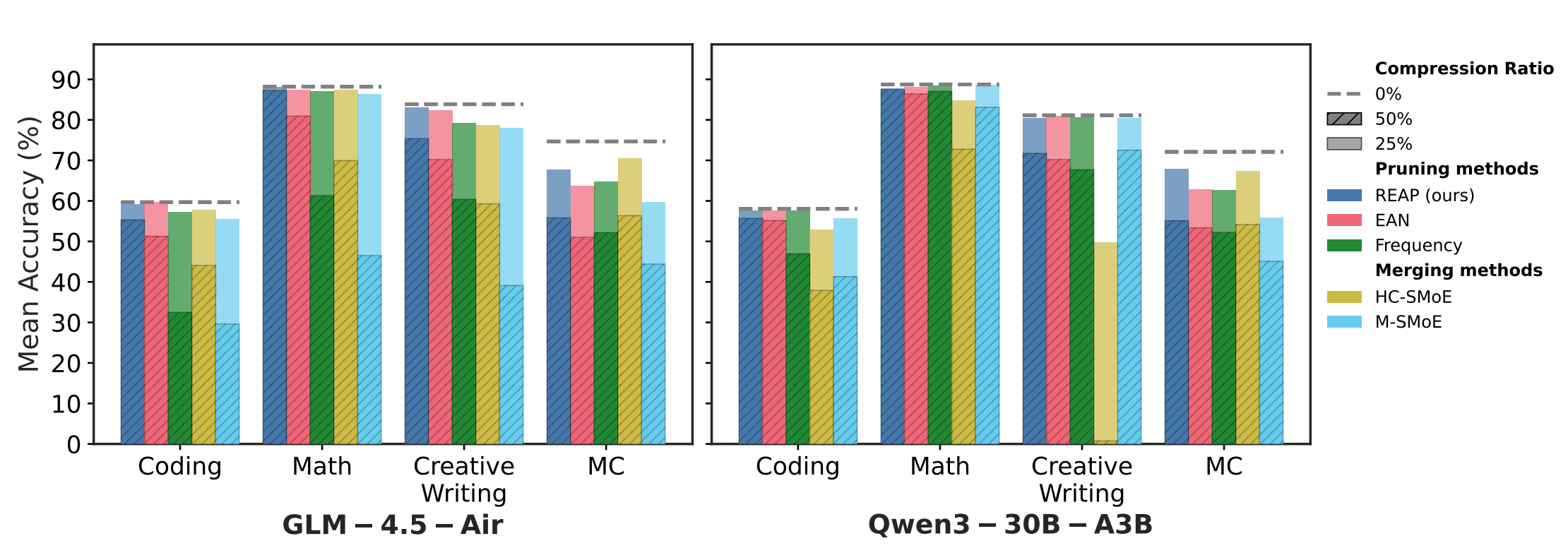
- The Unseen Frontier: Pushing the Limits of LLM Sparsity with Surrogate-Free ADMM (https://arxiv.org/pdf/2510.01650). This paper tackles the limitation of existing pruning methods for large language models, which struggle to exceed 50–60% sparsity without severe performance loss. The authors attribute this to the use of indirect objectives, such as minimizing layer-wise reconstruction errors, which accumulate mistakes and lead to suboptimal outcomes. To address this, the proposed method, ELSA, directly optimizes the true task objective — minimizing loss on actual downstream tasks — rather than relying on surrogate goals. It leverages the ADMM framework, a proven mathematical technique that decomposes complex problems into simpler alternating steps, to guide the pruning process while maintaining alignment with the model’s real objectives. A lightweight variant, ELSA-L, further improves scalability by using lower-precision data formats, enabling efficient pruning of even larger models. ELSA achieves 7.8× lower perplexity than the best existing method on LLaMA-2-7B at 90% sparsity. Although some accuracy loss remains, this represents a major breakthrough, and the authors argue that improved global optimization, like their approach, could further narrow this gap.
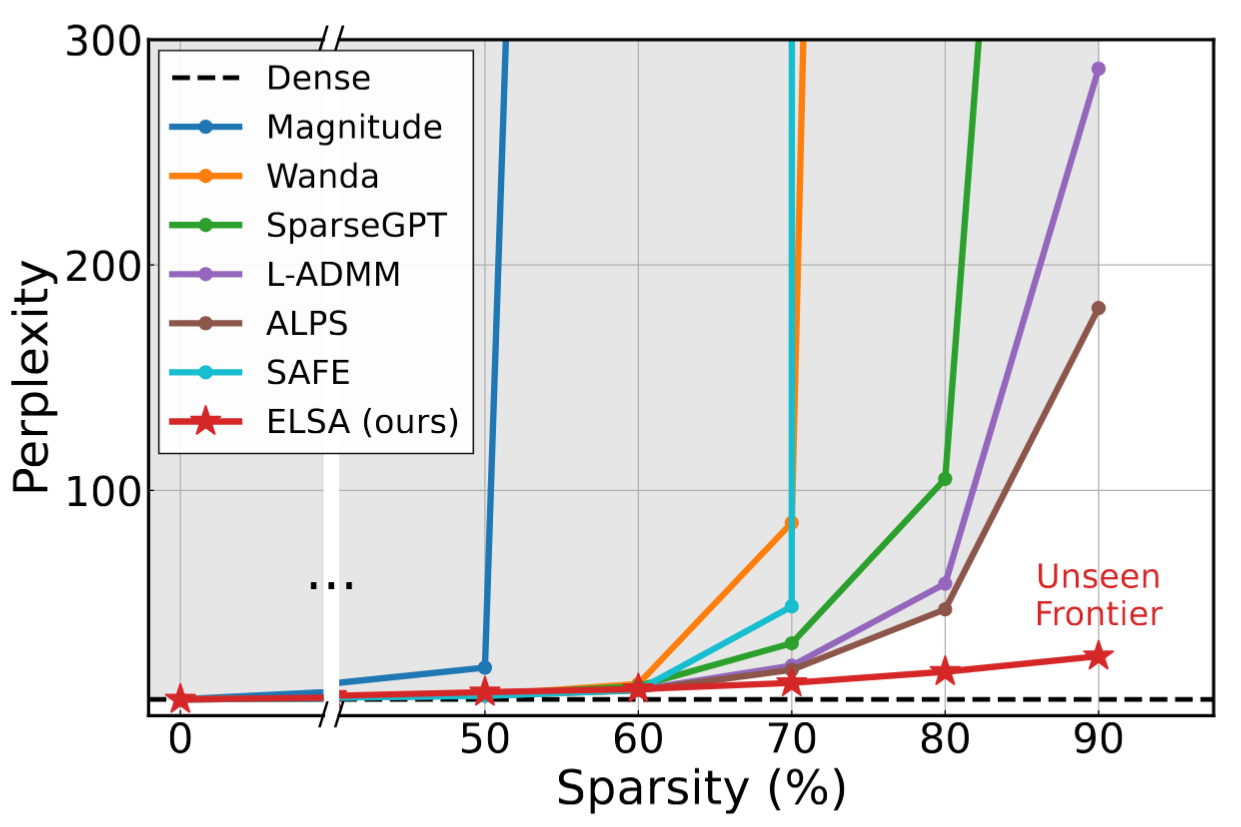
Other
- Top-H Decoding: Adapting the Creativity and Coherence with Bounded Entropy in Text Generation (https://openreview.net/pdf/0b494e52bae7fe34f7af35e0d5bfa6bd0dcb39b8.pdf). Toward effective incorporation of the confidence of the model while generating tokens, the authors propose top-H decoding. The authors first establish the theoretical foundation of the interplay between creativity and coherence in truncated sampling by formulating an entropy-constrained minimum divergence problem. Then they prove this minimization problem to be equivalent to an entropy-constrained mass maximization (ECMM) problem, which is NP-hard. Finally, the paper presents top-H decoding, a computationally viable greedy algorithmic approximation to solve the ECMM problem. Extensive empirical evaluations demonstrate that top-H outperforms the state-of-the-art (SoTA) alternative of min-p sampling by up to 25.63% on creative writing benchmarks, while maintaining robustness on question-answering datasets such as GPQA, GSM8K, and MT-Bench. Additionally, an LLM-as-judge evaluation confirms that top-H indeed produces coherent outputs even at higher temperatures, where creativity is especially critical. In summary, top-H advances SoTA in open-ended text generation and can be easily integrated into creative writing applications. The code is available at: https://github.com/ErfanBaghaei/Top-H-Decoding.
- Stop Spinning Wheels: Mitigating LLM Overthinking via Mining Patterns for Early Reasoning Exit (https://arxiv.org/pdf/2508.17627). The authors introduce a lightweight framework to detect and terminate reasoning at the optimal Reasoning Completion Point (RCP), preventing unnecessary token generation in large reasoning models. They categorize the reasoning process of LLMs into three stages: insufficient exploration, compensatory reasoning, and reasoning convergence. Typically, LLMs produce correct answers during the compensatory reasoning stage, while the reasoning convergence stage often triggers overthinking, leading to excessive resource usage or even infinite loops. The RCP is defined as the boundary marking the end of the compensatory reasoning stage and typically appears at the end of the first complete reasoning cycle, beyond which additional reasoning offers no accuracy gain. To balance efficiency and accuracy, the authors distilled insights from CatBoost feature importance analysis into a concise and effective set of stepwise heuristic rules. Experiments on benchmarks such as AIME24, AIME25, and GPQA-D demonstrate that the proposed strategy reduces token consumption by over 30% while maintaining or improving reasoning accuracy.
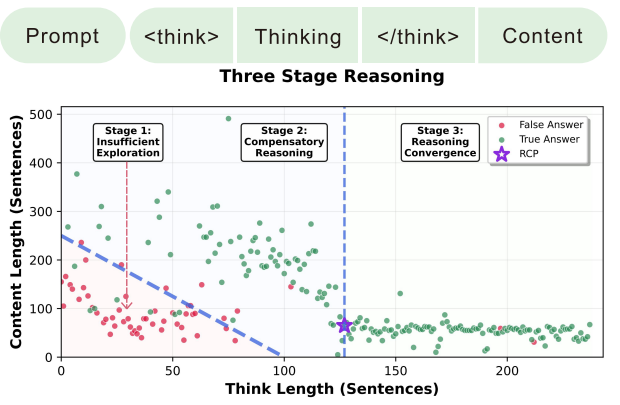
- A Systematic Analysis of Hybrid Linear Attention (https://arxiv.org/pdf/2507.06457). This work systematically analyzes hybrid linear attention architectures to balance computational efficiency with long-range recall in large language models. The authors construct hybrid models by interleaving linear and full attention layers at varying ratios (24:1, 12:1, 6:1, 3:1) to analyze their impact on performance and efficiency. The key insight is that gating, hierarchical recurrence, and controlled forgetting mechanisms are critical to achieve Transformer-level recall in hybrid architectures when deployed at a 3:1 to 6:1 linear-to-full attention ratio, reducing KV cache memory by a factor of 4-7x.
- Gumiho: A Hybrid Architecture to Prioritize Early Tokens in Speculative Decoding (https://arxiv.org/pdf/2503.10135). The authors deliver a new Speculative Decoding (SD) method for accelerating Large Language Model (LLM) inference. This is an incremental improvement of the Eagle SD method from NVIDIA. Its core insight is that early tokens in a speculative decoding draft are disproportionately more important than later ones. The paper introduces a novel hybrid architecture to exploit this: a high-accuracy serial Transformer for the crucial first tokens and efficient parallel MLPs for subsequent ones. Gumiho surpasses the existing SOTA method EAGLE-2 by 4.5%∼15.8%, but does not have a comparison with EAGLE-3. The code: https://github.com/AMD-AGI/Gumiho
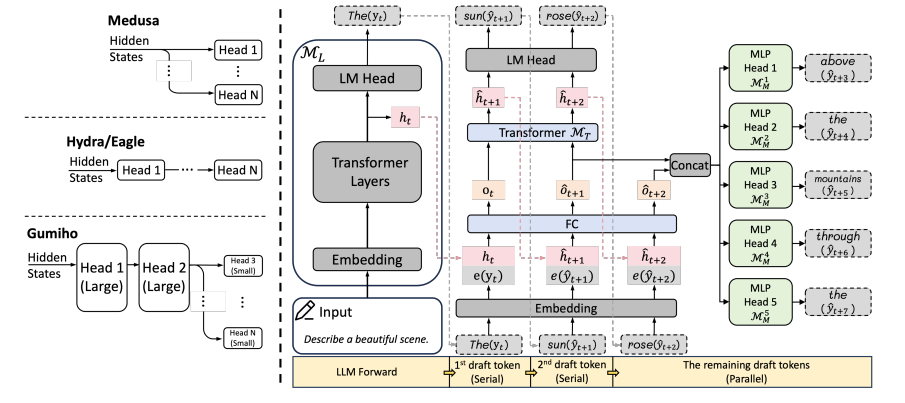
Software
- OptiLLM (https://github.com/algorithmicsuperintelligence/optillm) is an OpenAI API-compatible optimizing inference proxy that implements 20+ state-of-the-art techniques to dramatically improve LLM accuracy and performance on reasoning tasks - without requiring any model training or fine-tuning. It is possible to beat the frontier models using these techniques across diverse tasks by doing additional compute at inference time.
- FlashDMoE (https://flash-moe.github.io): Fast Distributed MoE in a Single Kernel - a fully GPU-resident MoE operator that fuses expert computation and inter-GPU communication into a single persistent GPU kernel. FlashDMoE enables fine-grained pipelining of dispatch, compute, and combine phases, eliminating launch overheads and reducing idle gaps.
- LMCache (https://github.com/LMCache/LMCache) is an LLM serving extension that cuts TTFT and boosts throughput in long-context scenarios. By storing the KV caches of reusable texts across various locations, including (GPU, CPU DRAM, Local Disk), LMCache reuses the KV caches of any reused text (not necessarily prefix) in any serving engine instance. Integrated with vLLM, LMCache delivers 3–10× faster responses and lower GPU usage in tasks like multi-round QA and RAG.
- Flash Attention 4 (FA4) is a newly developed CUDA kernel optimized for Nvidia’s Blackwell architecture, delivering roughly a 20% performance improvement over previous versions. It achieves this speedup through an asynchronous pipeline of operations and several mathematical optimizations, including a fast exponential approximation and a more efficient online softmax. Tri Dao presented early results of FA4 at Hot Chips, and further implementation details were later shared in a blog post: https://modal.com/blog/reverse-engineer-flash-attention-4.
Q2'25: Technology Update – Low Precision and Model Optimization
Authors
Alexander Suslov, Alexander Kozlov, Nikolay Lyalyushkin, Nikita Savelyev, Souvikk Kundu, Andrey Anufriev, Pablo Munoz, Liubov Talamanova, Daniil Lyakhov, Yury Gorbachev, Nilesh Jain, Maxim Proshin, Evangelos Georganas
Summary
This quarter marked a major shift towards efficiency in large-scale AI, driven by the unsustainable computational and memory costs of current architectures. The focus is now on making models dramatically faster and more hardware-friendly, especially for demanding long-context and multimodal tasks. 🚀 There is a growing adoption of dynamic, data-aware techniques like dynamic sparse attention and token pruning, which intelligently reduce computation by focusing only on the most critical information. Furthermore, optimization is increasingly tailored to new hardware through ultra-low precision; quantization is being pushed to the extreme, with native 1-bit (BitNet) inference and 4-bit (FP4) training becoming viable by aligning directly with new GPU capabilities.
A parallel trend is the creation of simple, readable frameworks like Nano-vLLM, whose lightweight design aims to lower the barrier to entry for developers and researchers.
Highlights
- MMInference: Accelerating Pre-filling for Long-Context Visual Language Models via Modality-Aware Permutation Sparse Attention (https://arxiv.org/pdf/2502.02631). The authors introduce MMInference (Multimodality Million tokens Inference), a dynamic sparse attention method that accelerates the prefilling stage for long-context multi-modal inputs. The core ideas stemfrom analyzing the attention patterns specific to multi-modal inputs in VLMs: (1) Visual inputs exhibit strong temporal and spatial locality, leading to a unique sparse pattern the authors term the "Grid pattern".(2) Attention patterns differ significantly within a modality versus across modalities. The authors introduces the permutation-based method for offline searching the optimal sparse patterns for each head based on the input andoptimized kernels to compute attention much faster. MMInference speeds up the VLM pre-filling stage by up to 8.3x (at 1 million tokens) without losing accuracy and without needing any model retraining.The paper demonstrates maintained performance across various multi-modal benchmarks (like Video QA and Captioning) using state-of-the-art models (LongVila, LlavaVideo, VideoChat-Flash, Qwen2.5-VL). The code is available at https://aka.ms/MMInference.
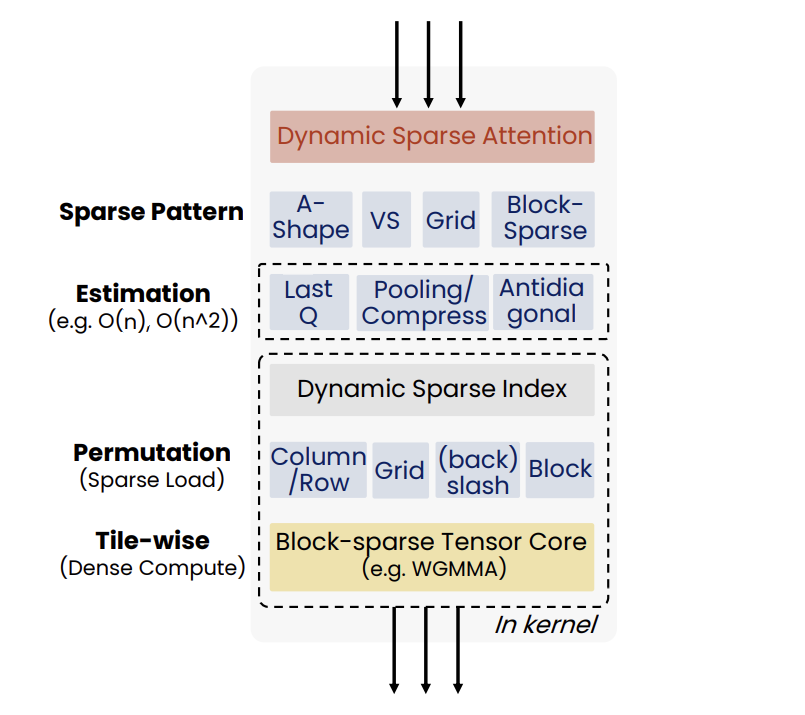
- Beyond Text-Visual Attention: Exploiting Visual Cues for Effective Token Pruning in VLMs (https://arxiv.org/pdf/2412.01818). The authors introduce VisPruner, a training-free method for compressing visual token sequences in VLMs, dramatically reducing computational overhead. Unlike prior approaches that rely on text-visual attention scores - often biased and dispersed - VisPruner leverages visual cues directly from the visual encoder. They identify two key flaws in attention-based pruning: (1) attention shift: positional bias causes attention to favor lower image regions (tokens closer to the text in sequence); (2) attention dispersion: attention is spread too uniformly, making it hard to identify important tokens. VisPruner first selects a small set of important tokens using [CLS] attention (typically focused on foreground objects), then complements them with diverse tokens selected via similarity-based filtering to preserve background and contextual information. This visual-centric pruning strategy avoids reliance on language model internals and is compatible with fast attention mechanisms like FlashAttention. VisPruner outperforms finetuning-free baselines like FastV, SparseVLM, and VisionZip across 13 benchmarks—including high-resolution and video tasks—even when retaining as little as 5% of the original visual tokens. It achieves up to 95% FLOPs reduction and 75% latency reduction.
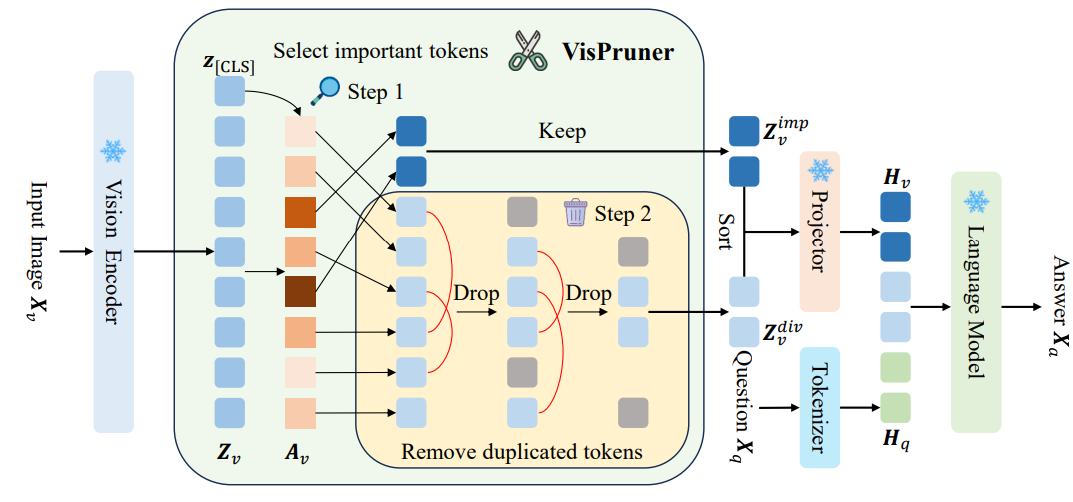
- OuroMamba: A Data-Free Quantization Framework for Vision Mamba Models (https://www.arxiv.org/pdf/2503.10959). The authors present OuroMamba, the first data-free post-training quantization (DFQ) method for vision Mamba-based models (VMMs). The authors identify two key challenges in enabling DFQ for VMMs, (1) VMM’s recurrent state transitions restricts capturing of long-range interactions and leads to semantically weak synthetic data,(2) VMM activation exhibit dynamic outlier variations across time-steps, rendering existing static PTQ techniques ineffective. To address these challenges, OuroMamba presents a two-stage framework: (1) OuroMamba-Gen to generate semantically rich and meaningful synthetic data. It applies constructive learning on patch level VMM features generated through neighborhood interactions in the latent state space, (2) OuroMamba-Quant to employ mixed-precision quantization with lightweight dynamic outlier detection during inference. In specific, the paper presents a threshold based outlier channel selection strategy for activation that gets updated every time-step. Extensive experiments across vision and generative tasks show that our data-free OuroMamba surpasses existing data-driven PTQ techniques, achieving state-of-the-art performance across diverse quantization settings. Additionally, the authors demonstrate the efficacy via implementation of efficient GPU kernels to achieve practical latency speedup of up to 2.36×.
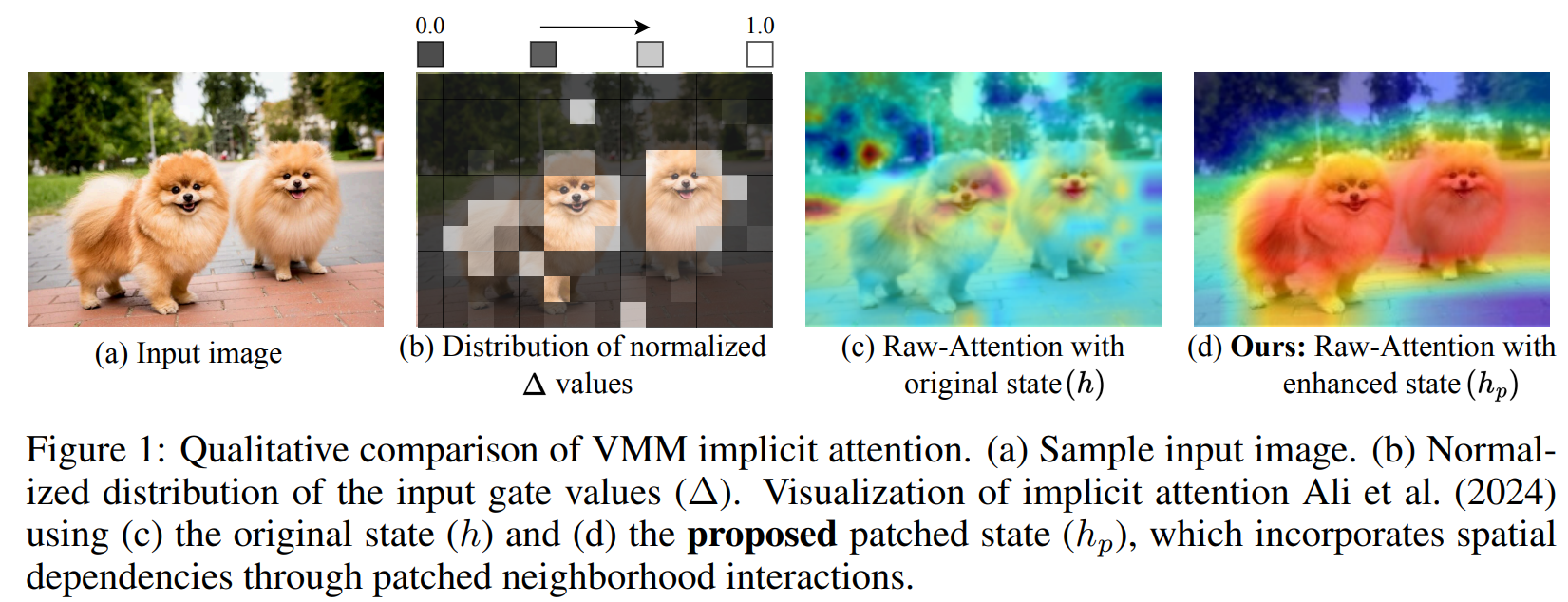
- TailorKV: A Hybrid Framework for Long-Context Inference via Tailored KV Cache Optimization (https://arxiv.org/pdf/2505.19586). TailorKV is a novel framework designed to optimize the KV cache in LLMs for long-context inference, significantly reducing GPU memory usage and latency without sacrificing model performance.Instead of applying a one-size-fits-all compression strategy, TailorKV intelligently tailors compression based on the characteristics of each Transformer layer. The authors look at how each layer distributes its attention across tokens: (1) If a layer spreads attention broadly across many tokens, it’s considered to be dense. These layers are good candidates for quantization, because compressing them doesn’t significantly harm performance (usually shallow layers). (2) If a layer focuses attention on just a few tokens, it’s considered to be sparse. These layers are better suited for sparse retrieval, where only the most important tokens are kept in memory (deeper layers). To make this decision, they compute a score for each layer that reflects how concentrated or spread out the attention is. If the score is above a certain threshold, the layer is labeled quantization-friendly; otherwise, it’s considered sparsity-friendly. This classification is done offline, meaning it’s calculated once before inference, so it doesn’t affect runtime performance. TailorKV drastically reduces memory usage by quantizing 1 to 2 layers to 1-bit precision and loading only 1% to 3% of the tokens for the remaining layers.Maintains high accuracy across diverse tasks and datasets, outperforming state-of-the-art methods like SnapKV, Quest, and PQCache on LongBench. Code is available at: https://github.com/ydyhello/TailorKV.

- Log-Linear Attention (https://arxiv.org/pdf/2506.04761). The authors present Log-Linear Attention, a general framework that extends linear attention and state-space models by introducing a logarithmic growing memory structure for efficient long-context modeling. The paper identifies two key limitations in prior linear attention architectures: (1) the use of fixed-size hidden states restricts their ability to model multi-scale temporal dependencies, and (2) their performance degrades on long sequences due to the lack of hierarchical context aggregation.To address these challenges, Log-Linear Attention places a particular structure on the attention mask, enabling the compute cost to be log-linear and the memory cost to be logarithmic in sequence length (O(TlogT) training time,O(logT) inference time and memory). Conceptually, it uses a Fenwick tree–based scheme to hierarchically partition the input into power-of-two-sized segments. Each query attends to a logarithmic number of hidden states, summarizing increasingly coarse ranges of past tokens. This design emphasizes recent context with finer granularity, while efficiently compressing distant information.The framework is instantiated on top of two representative models: Mamba-2 and Gated DeltaNet, resulting in Log-Linear Mamba-2 and Log-Linear Gated DeltaNet. These variants inherit the expressive recurrence structures of their linear counterparts but benefit from logarithmic memory growth and sub-quadratic training algorithms via a custom chunk-wise parallel scan implementation in Triton.Experiments across language modeling, long-context retrieval, and in-context reasoning benchmarks show that Log-Linear Attention consistently improves long-range recall while achieving competitive or better throughput than FlashAttention-2 at longer sequence lengths (>8K). The code is available at https://github.com/HanGuo97/log-linear-attention.
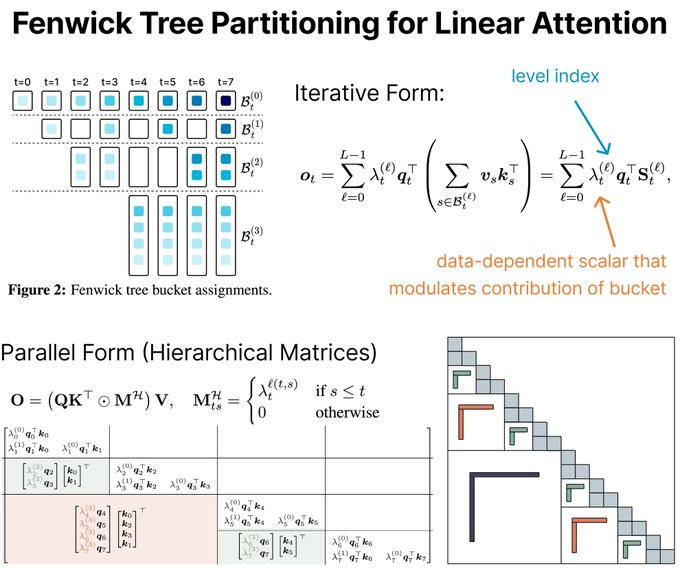
- The Sparse Frontier: Sparse Attention Trade-offs in Transformer LLMs (https://arxiv.org/pdf/2504.17768). The authors introduce SparseFrontier, a systematic evaluation of dynamic sparse attention methods aimed at accelerating inference in LLMs for long-context inputs (up to 128K tokens). The core ideas stem from an extensive analysis of sparse attention trade-offs across different inference stages, model scales, and task types: (1) Sparse attention during decoding tolerates higher sparsity than during prefilling, particularly in larger models, due to differences in memory and compute bottlenecks.(2) No single sparse pattern is optimal across all tasks - retrieval, aggregation, and reasoning tasks each require different units of sparsification (e.g., blocks vs. tokens) and budget strategies. During prefilling, the best sparsification structure (e.g., blocks or verticals and slashes) is task-dependent, with uniform allocation across layers performing comparably to dynamic allocation. During decoding, page-level Quest excels by preserving the KV cache structure, avoiding the performance degradation associated with token pruning during generation. Their FLOPS analysis shows that for long context, large sparse models outperform smaller dense ones at the same compute cost. They also establish scaling laws predicting accuracy from model size, sequence length, and compression ratio.The code is available at: https://github.com/PiotrNawrot/sparse-frontier.
Papers with notable results
Quantization
- SeedLM: Compressing LLM Weights into Seeds of Pseudo-Random Generators (https://arxiv.org/pdf/2410.10714). This paper introduces SeedLM, a novel data-free post-training compression method for Large Language Models (LLMs) that uses seeds of pseudo-random generators and some coefficients to recreate model weights. SeedLM aims to reduce memory access and leverage idle compute cycles during inference, effectively speeding up memory-bound tasks by trading compute for fewer memory accesses.The method generalizes well across diverse tasks, achieving better zero-shot accuracy retention at 4- and 3-bit compression compared to OmniQuant, AWQ and QuIP#. Additionally, FPGA-based tests demonstrate close to 4x speedup for memory-bound tasks such as generation for 4bit per value over an FP16 Llama baseline.
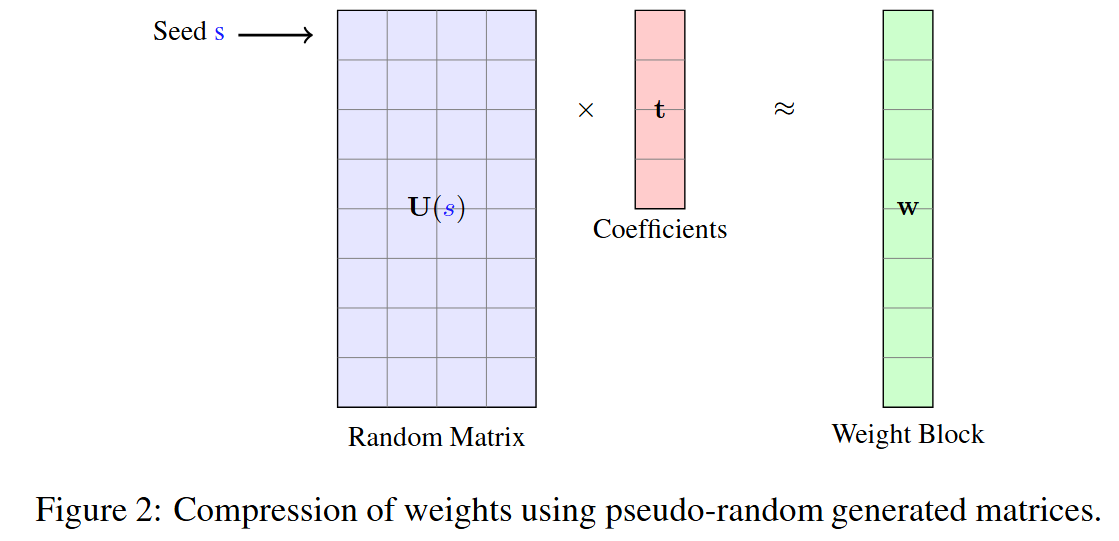
- LoTA-QAF: Lossless Ternary Adaptation for Quantization-Aware Fine-Tuning (https://arxiv.org/pdf/2505.18724). LoTA-QAF is a quantization-aware fine-tuning method for LLMs designed for efficient edge deployment. Its key innovation is a ternary adaptation approach, where ternary adapter matrices can only increment, decrement, or leave unchanged each quantized integer weight (+1, −1, or 0) within the quantization grid during fine-tuning. This tightly restricts the amount each quantized value can change, ensuring the adapters do not make large modifications to weights. The method enables lossless merging of adaptation into the quantized model, preserving computational efficiency and model performance with no quantization-induced accuracy loss at merge. The method uses a novel ternary signed gradient descent (t-SignSGD) optimizer to efficiently update these highly constrained ternary weights. Evaluated on the Llama-3.1/3.3 and Qwen-2.5 families, LoTA-QAF consistently outperforms previous quantization-aware fine-tuning methods such as QA-LoRA, especially at very low bit-widths (2-bit and 3-bit quantization), recovering up to 5.14% more accuracy on MMLU compared to LoRA under 2-bit quantization, while also being 1.7x–2x faster at inference after merging. Task-specific fine-tuning shows LoTA-QAF improves on other quantization-aware methods, though it slightly lags behind full-precision LoRA in those scenarios.The code is available at: https://github.com/KingdalfGoodman/LoTA-QAF.
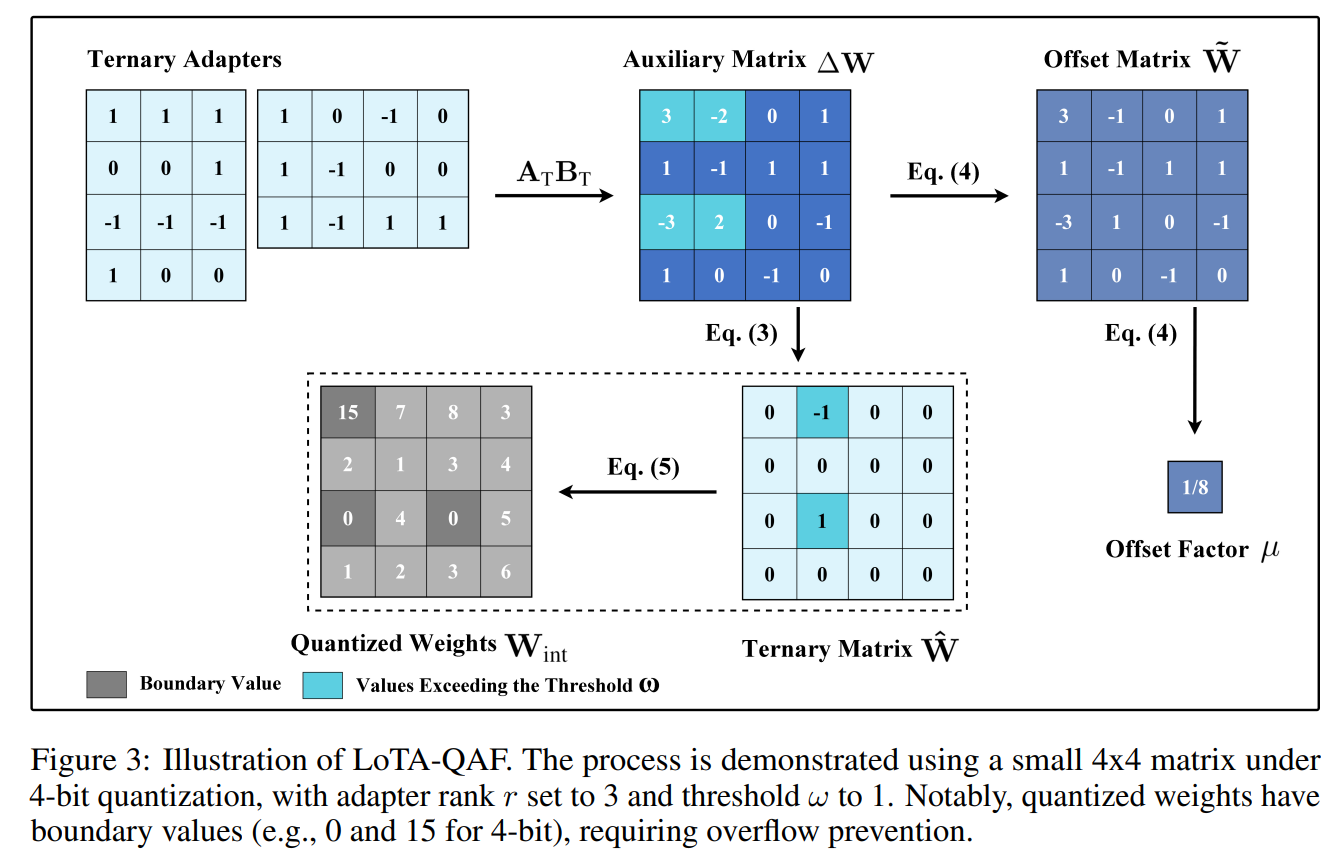
- SageAttention3: Microscaling FP4 Attention for Inference and An Exploration of 8-bit Training (https://arxiv.org/abs/2505.11594). The authors introduce SageAttention3, a novel FP4 micro-scaling quantization technique for Transformer attention designed to achieve a 5x speedup in inference on NVIDIA GPUs and an 8-bit novel training approach that preserves model accuracy during finetuning while reducing memory demands. The method applies FP4 quantization to the two main attention matrix multiplications, using a microscaling strategy with a group size of 16 elements per scale factor. This fine granularity limits the impact of outlier values that can otherwise cause significant quantization error. To address issues with quantizing the attention map, the authors propose a two-level quantization scheme. First, each row of attention map is scaled into the range[0, 448 × 6], which ensures the FP8 scaling factor (required by hardware) fully utilizes its representation range. Then, FP4 quantization is applied at the block level. This two-step process significantly reduces quantization error compared to direct quantization. Empirical results show that SageAttention3 delivers substantial inference speedups with minimal quality loss on language, image, and video generation benchmarks. The code is available at: https://github.com/thu-ml/SageAttention.

- MambaQuant: Quantizing the Mamba Family with Variance Aligned Rotation Methods (https://arxiv.org/abs/2501.13484). This paper tackles the challenge of post-training quantization for Mamba architectures. Standard quantization techniques adapted from large language models result in substantial accuracy loss when applied to Mamba models, largely due to extreme outliers and inconsistent variances across different channels in weights and activations. To address these issues, the authors propose MambaQuant, introducing two variance alignment techniques: KLT-Enhanced and Smooth-Fused rotations. These methods effectively equalize channel variances, resulting in more uniform data distributions before quantization. Experimental results show that MambaQuant enables Mamba models to be quantized to 8 bits for both weights and activations with less than 1% loss in accuracy, markedly surpassing previous approaches on both vision and language tasks.
- APHQ-ViT: Post-Training Quantization with Average Perturbation Hessian Based Reconstruction for Vision Transformers (https://arxiv.org/pdf/2504.02508). APHQ-ViT is a PTQ method designed to address the challenges of quantizing Vision Transformers, particularly under ultra-low bit settings. Traditional reconstruction-based PTQ methods, effective for Convolutional Neural Networks, often fail with ViTs due to inaccurate estimation of output importance and significant accuracy degradation when quantizing post-GELU activations. To overcome these issues, APHQ-ViT introduces an improved Average Perturbation Hessian (APH) loss for better importance estimation. Additionally, it proposes an MLP Reconstruction technique that replaces the GELU activation function with ReLU in the MLP modules and reconstructs them using the APH loss on a small unlabeled calibration set. Experiments demonstrate that APHQ-ViT, utilizing linear quantizers, outperforms existing PTQ methods by substantial margins in 3-bit and 4-bit quantization across various vision tasks. The source code for APHQ-ViT is available at https://github.com/GoatWu/APHQ-ViT.
- DL-QAT: Weight-Decomposed Low-Rank Quantization-Aware Training for Large Language Models (https://arxiv.org/abs/2504.09223). DL-QAT is a quantization-aware training (QAT) technique for LLMs that achieves high efficiency by updating less than 1% of parameters. It introduces group-specific quantization magnitudes and uses LoRA-based low-rank adaptation within the quantization space. Tested on LLaMA and LLaMA2, DL-QAT outperforms previous state-of-the-art methods—including QA-LoRA and LLM-QAT - by up to 4.2% on MMLU benchmarks for 3-bit models, while greatly reducing memory and training costs.
- BitNet b1.58 2B4T Technical Report (https://arxiv.org/abs/2504.09223). Microsoft Research released the weights for BitNet b1.58 2B4T, the first open-source, native 1-bit Large Language Model (LLM) at the 2-billion parameter scale and inference framework bitnet.cpp. The new 2B model demonstrates performance comparable to the Qwen 2.5 1.5B on benchmarks, while operating at 2x the speed and consuming 12x less energy.
- Quartet: Native FP4 Training Can Be Optimal for Large Language Models (https://arxiv.org/pdf/2505.14669). The authors introduced a new method "Quarter" for the stable 4-bit floating-point (FP4) training. There is specifically designed for the native FP4 hardware in NVIDIA's new Blackwell GPUs and achieved a nearly 2x speedup on the most intensive training computations compared to 8-bit techniques, all while maintaining "near-lossless" accuracy. The method outlines to perform a forward pass that minimizes MSE (based on QuEST) together with a backwardpass that is unbiased (based on Stochastic Rounding). The code of extremely efficient GPU-aware implementation https://github.com/IST-DASLab/Quartet
- InfiJanice: Joint Analysis and In-situ Correction Engine for Quantization-Induced Math Degradation in Large Language Models (https://arxiv.org/pdf/2505.11574). The authours investigates how quantization significantly harms the mathematical reasoning abilities of LLMs. The study reveals that quantization can degrade reasoning accuracy by up to 69.81% on complex benchmarks, with smaller models being more severely affected. Authors developed an automated pipeline to analyze and categorize the specific errors introduced by quantization. Based on these findings, they created a compact, targeted dataset named "Silver Bullet." The most notable result is that fine-tuning a quantized model on as few as 332 of these curated examples for just 3–5 minutes on a single GPU is sufficient to restore its mathematical reasoning accuracy to the level of the original, full-precision model.
Pruning/Sparsity
- Token Sequence Compression for Efficient Multimodal Computing (https://arxiv.org/pdf/2504.17892). The authors introduce a training-free method for compressing visual token sequences in visual language models (VLMs), significantly reducing computational costs. Instead of relying on attention-based “saliency”—a measure of how much attention a model gives to each token—they use simple clustering to group similar visual tokens and aggregate them. Their “Cluster & Aggregate” approach outperforms prior finetuning-free methods like VisionZip and SparseVLM across 8+ benchmarks, even when retaining as little as 11% of the original tokens. Surprisingly, random and spatial sampling also perform competitively, revealing high redundancy in visual encodings.
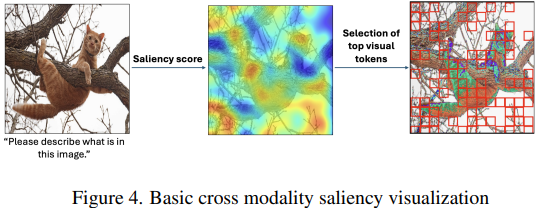
- Beyond 2:4: exploring V:N:M sparsity for efficient transformer inference on GPUs (https://arxiv.org/abs/2410.16135). This paper introduces and systematically studies V:N:M sparsity as a more efficient and flexible alternative to the industry-standard 2:4 sparsity for accelerating Transformer inference on GPUs. In the V:N:M approach, weight matrices are divided into V×M blocks; within each block, most columns are pruned, and 2:4 sparsity is then applied to the remaining columns. This scheme enables significantly higher and more adaptable sparsity ratios, while remaining compatible with existing GPU sparse tensor core acceleration. The authors propose a comprehensive framework for creating V:N:M-sparse Transformers: it features a heuristic method for selecting V and M values to optimize the accuracy-speedup trade-off, a V:N:M-specific channel permutation method for improving accuracy in low-budget training scenarios, and a three-stage LoRA training process for memory-efficient fine-tuning. Experimental results show that V:N:M-sparse Transformers can achieve much higher sparsity levels - such as 75% parameter reduction, while maintaining nearly lossless accuracy on downstream tasks, and outperform 2:4 sparsity in both speed and flexibility.
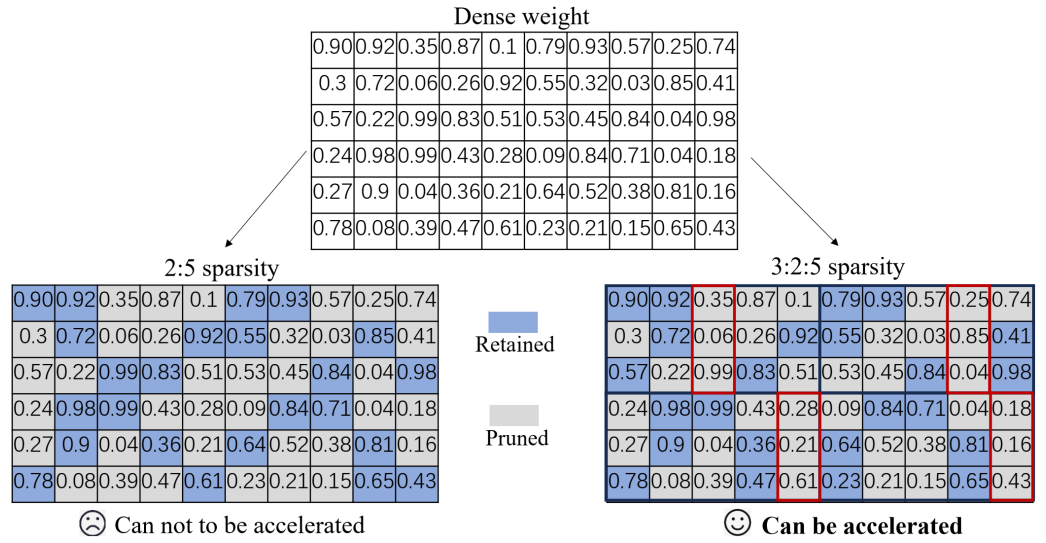
- TopV: Compatible Token Pruning with Inference Time Optimization for Fast and Low-Memory Multimodal Vision Language Model (https://arxiv.org/pdf/2503.18278v2). The authors introduce a training-free, optimization-based framework for reducing visual token redundancy in VLMs. Visual tokens often dominate the input sequence—up to 95% in some models. TopV addresses this by pruning unimportant visual tokens once during the prefilling stage, before decoding begins.Instead of relying on attention scores, TopV estimates the importance of each visual token by solving an optimal transport problem. In this setup: (1) Source tokens are the input visual tokens entering a specific transformer layer. (2) Target tokens are the output visual tokens after that layer has processed the input—specifically, the output after the Post-LN sub-layer. TopV calculates how much each input token contributes to the output using the Sinkhorn algorithm, guided by a cost function that considers: (1) How similar the tokens are in content (feature similarity), (2) How close they are in the image (spatial proximity), (3) How central they are in the image (centrality). To prevent visual collapse—especially in detail-sensitive tasks like OCR and captioning—TopV includes a lightweight recovery step. From the discarded tokens, TopV uniformly samples a subset at regular intervals (e.g., every 4th or 6th token) and reinserts them into the token sequence alongside the top-k tokens, ensuring spatial diversity and semantic coverage without significant overhead.TopV performs pruning once after the prompt and image are processed. The pruned visual token set remains fixed throughout decoding, enabling efficient and consistent inference.
- SparseVLM: Visual Token Sparsification for Efficient Vision-Language Model Inference (https://arxiv.org/pdf/2410.04417). SparseVLM introduces a lightweight, training-free framework for visual token sparsification in vision-language models (VLMs). Unlike text-agnostic approaches, it leverages cross-attention to identify text-relevant visual tokens (“raters”) and adaptively prunes others based on the rank of the attention matrix. Crucially, SparseVLM doesn’t discard all pruned tokens—instead, it recycles the most informative ones (those with high attention relevance scores). These are grouped using a density peak clustering algorithm, and each cluster is compressed into a single representative token. The reconstructed tokens are then reinserted into the model, replacing the larger set of pruned tokens with a compact, information-rich representation. Applied to LLaVA, SparseVLM achieves a 4.5× compression rate with only a 0.9% accuracy drop, reduces CUDA latency by 37%, and saves 67% memory. The code is available at https://github.com/Gumpest/SparseVLMs.
Other
- Hogwild! Inference: Parallel LLM Generation via Concurrent Attention (https://arxiv.org/pdf/2504.06261). Hogwild! Inference introduces a novel paradigm for parallel inference for reasoning tasks that departs significantly from prior structured approaches by enabling dynamic, parallel collaboration. The method runs multiple LLM "workers" concurrently, allowing them to interact in real-time through a shared Key-Value (KV) cache. This shared workspace lets workers see each other's progress as it happens, fostering emergent teamwork without rigid, pre-planned coordination. A key innovation is the efficient use of Rotary Position Embeddings (RoPE) to synchronize the workers' views of the shared cache with minimal computational overhead. Empirical results show significant wall-clock speedups—up to 3.6x with 4 workers—on complex reasoning tasks. This is achieved "out of the box" on existing models without requiring fine-tuning and can be stacked with another optimization methods such as speculative decoding. The technique fundamentally improves the speed-cost-quality trade-off for inference, shifting the paradigm from sequential "chains of thought" to collaborative "teams of thought". The code is available at https://github.com/eqimp/hogwild_llm.
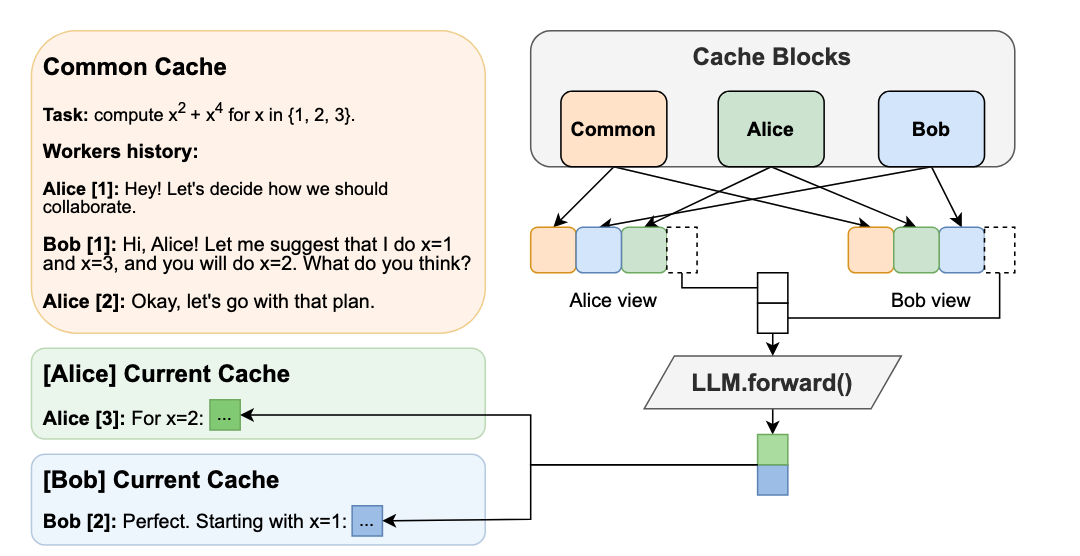
- Parallel Scaling Law for Language Models (https://arxiv.org/pdf/2505.10475). The authors introduce a novel "parallel" scaling method for LLMs (ParScale), distinct from traditional parameter (Dense, MoE) or inference-time (CoT) scaling. The technique processes a single input through 'P' parallel streams, each modified by a unique, learnable prefix vector. These streams are run concurrently on the same base model, and their outputs are intelligently aggregated by a small network. This method yields a quality improvement equivalent to increasing the model size by a factor of log(P), without actually expanding the core parameter count. For example, 8 parallel streams can match the performance of a model three times larger. ParScale is highly efficient for local inference, where memory bandwidth is the main bottleneck. Compared to direct parameter scaling for similar quality, it can require up to 22x less additional RAM and add 6x less latency. The approach can be applied for pretrained models, even with frozen weight, fine-tune only perscale components. The code is available at https://github.com/QwenLM/ParScale.
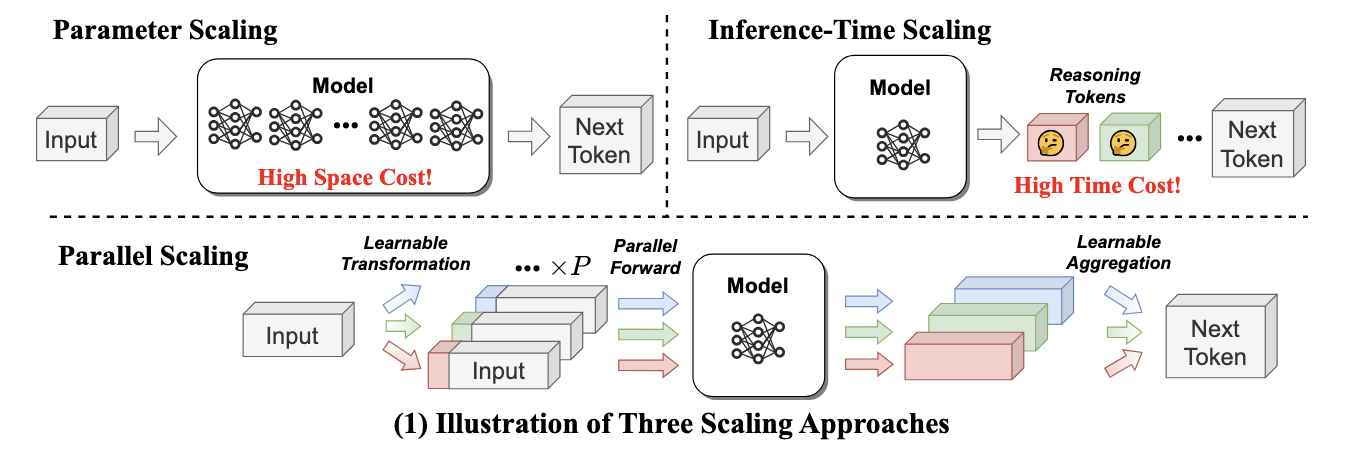
- Packing Input Frame Context in Next-Frame Prediction Models for Video Generation (https://arxiv.org/pdf/2504.12626). FramePack is a framework for next-frame prediction video generators that enables long-duration video synthesis with a constant computational cost (O(1)), regardless of length. It circumvents growing context windows by maintaining a fixed-size token buffer and codes input frames as shown in the figure below. To maintain temporal consistency and mitigate error accumulation, the system employs a bi-directional sampling scheme, alternating between forward and backward prediction passes. This efficiency allows a 13-billion parameter model to generate over 1800 frames (1 minute @ 30 fps) on a GPU with only 6GB of VRAM. The O(1) complexity in memory and latency makes FramePack a practical solution for generating minute-long videos on consumer hardware, with generation speeds of ~1.5 seconds per frame reported on an RTX 4090.The code is available at https://github.com/lllyasviel/FramePack.
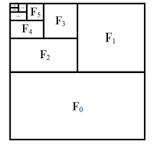
- MoDM: Efficient Serving for Image Generation via Mixture-of-Diffusion Models (https://arxiv.org/pdf/2503.11972). Diffusion-based text-to-image generation models trade latency for quality: small models are fast but generate lower quality images, while large models produce better images but are slow. This paper presents MoDM, a novel caching-based serving system for diffusion models that dynamically balances latency and quality through a mixture of diffusion models.Unlike prior approaches that rely on model-specific internal features, MoDM caches final images, allowing seamless retrieval and reuse across multiple diffusion model families.This design enables adaptive serving by dynamically balancing latency and image quality: using smaller models for cache-hit requests to reduce latency while reserving larger models for cache-miss requests to maintain quality. Small model image quality is preserved using retrieved cached images. MoDM has a global monitor that optimally allocates GPU resources and balances inference workload, ensuring high throughput while meeting Service-Level Objectives (SLOs) under varying request rates. Extensive evaluations show that MoDM significantly reduces an average serving time by 2.5× while retaining image quality, making it a practical solution for scalable and resource-efficient model deployment.
- Fast-dLLM: Training-free Acceleration of Diffusion LLM by Enabling KV Cache and Parallel Decoding (https://arxiv.org/abs/2505.22618). Fast-dLLM is a training-free method to accelerate diffusion-based large language models by introducing a block-wise KV Cache and confidence-aware parallel decoding. The block-wise KV Cache reuses more than 90% of attention activations with bidirectional (prefix and suffix) caching, delivering throughput improvements ranging from 8.1x to 27.6x while keeping accuracy loss under 2%. Confidence-aware parallel decoding selectively generates tokens that exceed a set confidence threshold (like 0.9), achieving up to 13.3x speedup and preserving output coherence thanks to theoretical guarantees. Experimentally, Fast-dLLM achieves up to 27.6× end-to-end speedup on 1024-token sequences (e.g., LLaDA, 8-shot) and keeps accuracy within 2% of the baseline across major reasoning and code benchmarks including GSM8K, MATH, HumanEval, and MBPP.
- SANA-Sprint: One-Step Diffusion with Continuous-Time Consistency Distillation (https://arxiv.org/pdf/2503.09641). SANA-Sprint is a highly efficient text-to-image diffusion model designed for ultra-fast generation. Its core innovation is a hybrid distillation framework that combines continuous-time consistency models (sCM) with latent adversarial diffusion distillation (LADD). This approach drastically reduces inference requirements from over 20 steps to just 1-4. Key performance benchmarks establish a new state-of-the-art. In a single step, SANA-Sprint generates a 1024x1024 image with FID of 7.59. This is achieved with a latency of just 0.1 seconds on an NVIDIA H100 GPU and 0.31 seconds on a consumer RTX 4090. This makes it approximately 10 times faster than its competitor, FLUX-schnell, while also delivering higher image quality.The code is available at https://github.com/NVlabs/Sana.
Software
- FlashRNN: I/O-Aware Optimization of Traditional RNNs on modern hardware (https://arxiv.org/abs/2412.07752). FlashRNN extends traditional RNNs - such as LSTMs and GRUs - by introducing a parallelization scheme where the hidden state is divided into multiple smaller blocks, allowing for parallel computation similar to the head-wise processing in Transformers. The authors develop and open-source custom fused CUDA and Triton kernels that leverage the GPU memory hierarchy efficiently for both forward and backward passes, together with an automatic hardware-aware optimization framework. This approach achieves up to 50x speedup over vanilla PyTorch implementations, making RNNs competitive with Transformer-like models on modern GPUs. The code is available at: https://github.com/NX-AI/flashrnn.
- Nano-vLLM (https://github.com/GeeeekExplorer/nano-vllm). A lightweight vLLM implementation built from scratch.Key Features: (1)🚀 Fast offline inference - Comparable inference speeds to vLLM (2)📖 Readable codebase - Clean implementation in ~ 1,200 lines of Python code (3)⚡ Optimization Suite - Prefix caching, Tensor Parallelism, Torch compilation, CUDA graph, etc.
- NeMo-Inspector: A Visualization Tool for LLM Generation Analysis (https://arxiv.org/pdf/2505.00903). The authors introduce NeMo-Inspector, an open-source tool designed to simplify the analysis of synthetic datasets with integrated inference capabilities.
- FlashInfer: Efficient and Customizable Attention Engine for LLM Inference Serving (https://arxiv.org/pdf/2501.01005). The authors present FlashInfer: a customizable and efficient attention engine for LLM serving. FlashInfer tackles KV-cache storage heterogeneityusing block-sparse format and composable formats to optimize memory access and reduce redundancy, supports JIT compilation and load-balanced scheduling algorithm adjusts to dynamism of user requests while maintaining compatibility with CUDAGraph which requires static configuration. FlashInfer achieve29-69% inter-token-latency reduction compared to Triton, 28-30% latency reduction for long-context inference, and 13-17% speedup for LLM serving with parallel generation.The code is available at https://github.com/flashinfer-ai/flashinfer.
InternVL2-4B model enabling with OpenVINO
Authors: Hongbo Zhao, Fiona Zhao
Introduction
InternVL2.0 is a series of multimodal large language models available in various sizes. The InternVL2-4B model comprises InternViT-300M-448px, an MLP projector, and Phi-3-mini-128k-instruct. It delivers competitive performance comparable to proprietary commercial models across a range of capabilities, including document and chart comprehension, infographics question answering, scene text understanding and OCR tasks, scientific and mathematical problem solving, as well as cultural understanding and integrated multimodal functionalities.
You can find more information on github repository: https://github.com/zhaohb/InternVL2-4B-OV
OpenVINOTM backend on InternVL2-4B
Step 1: Install system dependency and setup environment
Create and enable python virtual environment
conda create -n ov_py310 python=3.10 -y
conda activate ov_py310Clone the InternVL2-4B-OV repository from github
git clonehttps://github.com/zhaohb/InternVL2-4B-OV
cd InternVL2-4B-OVInstall python dependency
pip install -r requirement.txt
pip install --pre -U openvino openvino-tokenizers --extra-index-url https://storage.openvinotoolkit.org/simple/wheels/nightlyStep2: Get HuggingFace model
huggingface-cli download --resume-download OpenGVLab/InternVL2-4B --local-dir InternVL2-4B--local-dir-use-symlinks False
cp modeling_phi3.py InternVL2-4B/modeling_phi3.py
cp modeling_intern_vit.py InternVL2-4B/modeling_intern_vit.pyStep 3: Export to OpenVINO™ model
python test_ov_internvl2.py -m ./InternVL2-4B -ov ./internvl2_ov_model -llm_int4_com -vision_int8 -llm_int8_quan -convert_model_only
Step4: Simple inference test with OpenVINO™
python test_ov_internvl2.py -m ./InternVL2-4B -ov ./internvl2_ov_model -llm_int4_com -vision_int8-llm_int8_quanQuestion: Please describe the image shortly.

Answer:
The image features a close-up view of a red panda resting on a wooden platform. The panda is characterized by its distinctive red fur, white face, and ears. The background shows a natural setting with green foliage and a wooden structure.
Here are the parameters with descriptions:
python test_ov_internvl2.py --help
usage: Export InternVL2 Model to IR [-h] [-m MODEL_ID] -ov OV_IR_DIR [-d DEVICE] [-pic PICTURE] [-p PROMPT] [-max MAX_NEW_TOKENS] [-llm_int4_com] [-vision_int8] [-llm_int8_quant] [-convert_model_only]
options:
-h, --help show this help message and exit
-m MODEL_ID, --model_id MODEL_ID model_id or directory for loading
-ov OV_IR_DIR, --ov_ir_dir OV_IR_DIR output directory for saving model
-d DEVICE, --device DEVICE inference device
-pic PICTURE, --picture PICTURE picture file
-p PROMPT, --prompt PROMPT prompt
-max MAX_NEW_TOKENS, --max_new_tokens MAX_NEW_TOKENS max_new_tokens
-llm_int4_com, --llm_int4_compress llm int4 weight scompress
-vision_int8, --vision_int8_quant vision int8 weights quantize
-llm_int8_quant, --llm_int8_quant llm int8 weights dynamic quantize
-convert_model_only, --convert_model_only convert model to ov only, do not do inference testSupported optimizations
1. Vision model INT8 quantization and SDPA optimization enabled
2. LLM model INT4 compression
3. LLM model INT8 dynamic quantization
4. LLM model with SDPA optimization enabled
Summary
This blog introduces how to use the OpenVINO™ python API to run the pipeline of the Internvl2-4B model, and uses a variety of acceleration methods to improve the inference speed.

